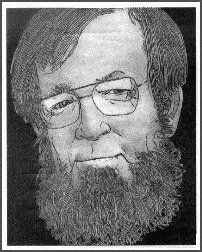
The new issue of The New York Review of Books has a nice review of Tracy Daugherty's new biography of Donald Barthelme, "Hiding Man." It sounds like a worthy read, a literary bio that achieves suspense in the life story you already know of 20th century Houston's most unlikely product, the man who blew the doors open on the opportunities of the short story for postmodern expression. From the review, which appears in full text at NYRB online:
In a way, Barthelme's work was all inner life, partially concealed, partially displayed. His stories are a registration of a certain kind of churning mind, cerebral fragments stitched together in the bricolage fashion of beatnik poetry. The muzzled cool, the giddy play, the tossed salad of high and low: everything from cartoon characters to opera gets referenced in a graffitti-like chain of sentences. Conventional narrative ideas of motivation and characterization generally are dispensed with. Language is seen as having its own random and self-generating vital life, a subject he takes on explicitly in the story "Sentence," which is one long never-ending sentence, full of self-interruptions and searching detours and not quite dead ends (like human DNA itself, with its inert, junk viruses), concluding with the words "a structure to be treasured for its weakness as opposed to the strength of stones."
The story "For I'm the Boy Whose Only Joy Is Loving You"—whose lilting title refers not to the Irish ballad "Bold O'Donahue," as Daugherty insists, but to an old Bing Crosby song called "Remember Me"—ends with a character's memory of Tuesday Weld turning from the screen to tell him that he was a good man. "He had immediately gotten up and walked out of the theater, gratification singing in his heart." When he is then physically assaulted, salt emerges from his eyes and "black blood from his ears, and from his mouth, all sorts of words." A belief in language and culture persists indomitably in Barthelme's sad, hip world and makes life worthwhile and deserving of what Thomas Pynchon has called "the radiant quality" of Barthelme's attention.
If you have never read any Barthelme, track down a copy of one of his collections — Sixty Stories is my favorite. Required reading for any contemporary fabulist, but somehow generationally neglected, notwithstanding the persistent adoration from the McSweeney's crowd.
Over at "barthelismo," they have a bunch of full texts of Barthelme's stories (with permission), full of amazing stuff — a voice simultaneously peculiar to its time (at least in terms of many of the referents -- see, e.g., the Vietnam War references in "The Indian Uprising") while resonating fresh power on every reading, eyeball kicking semiotic cryptomes loaded with potent feeling. For example, see "The Rise of Capitalism," excerpted below:
Honoré de Balzac went to the movies. He was watching his favorite flick, The Rise of Capitalism, with Simone Simon and Raymond Radiguet. When he had finished viewing the film, he went out and bought a printing plant, for fifty thousand francs. "Henceforth," he said, "I will publish myself, in handsome expensive de-luxe editions, cheap editions, and foreign editions, duodecimo, sexdecimo, octodecimo. I will also publish atlases, stamp albums, collected sermons, volumes of sex education, remarks, memoirs, diaries, railroad timetables, daily newspapers, telephone books, racing forms, manifestos, libretti, abecedaries, works on acupuncture, and cookbooks." And then Honoré went out and got drunk, and visited his girlfriend's house, and, roaring and stomping on the stairs, frightened her husband to death. And the husband was buried, and everyone stood silently around the grave, thinking of where they had been and where they were going, and the last handfuls of wet earth were cast upon the grave, and Honoré was sorry.
*
The Achievements of Capitalism:
The curtain wall
Artificial rain
Rockefeller Center
Canals
Mystification
*
"Capitalism sure is sunny!" cried the unemployed Laredo toolmaker, as I was out walking, in the streets of Laredo. "None of that noxious Central European miserabilism for us!" And indeed, everything I see about me seems to support his position. Laredo is doing very well now, thanks to application of the brilliant principles of the "new capitalism." Its Gross Laredo Product is up, and its internal contradictions are down. Catfish-farming, a new initiative in the agribusiness sector, has worked wonders. The dram-house and the card-house are each nineteen stories high. "No matter," Azalea says. "You are still a damn dawg, even if you have 'unveiled existence.'" At the Laredo Country Club, men and women are discussing the cathedrals of France, where all of them have just been. Some liked Tours, some Lyon, some Clermont. "A pious fear of God makes itself felt in this spot."
*
Capitalism arose and took off its pajamas. Another day, another dollar. Each man is valued at what he will bring in the marketplace. Meaning has been drained from work and assigned instead to remuneration. Unemployment obliterates the world of the unemployed individual. Cultural underdevelopment of the worker, as a technique of domination, is found everywhere under late capitalism. Authentic self-domination by individuals is thwarted. The false consciousness created and catered to by mass culture perpetuates ignorance and powerlessness. Strands of raven hair floating on the surface of the Ganges…Why can't they clean up the Ganges? If the wealthy capitalists who operate the Ganges wig factories could be forced to install sieves, at the mouths of their plants… And now the sacred Ganges is choked with hair, and the river no longer knows where to put its flow, and the moonlight on the Ganges is swallowed by the hair, and the water darkens. By Vishnu! This is an intolerable situation! Shouldn't something be done about it?

No comments:
Post a Comment